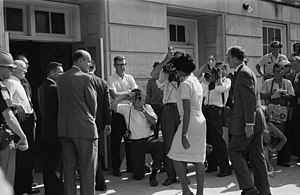Kuamo
Others
Wants to meet Engineers : Very Skillful In There Line Of Duty....
Articles
145
Followers
21
profile/9093IMG-20200801-WA0028.jpg
Kuamo

Racism
~6.4 mins read

African-American university student Vivian Malone entering the University of Alabama in the U.S. to register for classes as one of the first non-white students to attend the institution. Until 1963, the university was racially segregated and non-white students were not allowed to attend.
profile/9093IMG-20200801-WA0028.jpg
Kuamo

The Kingdom
~2.6 mins read
Advertisement

Link socials
Matches
Loading...
